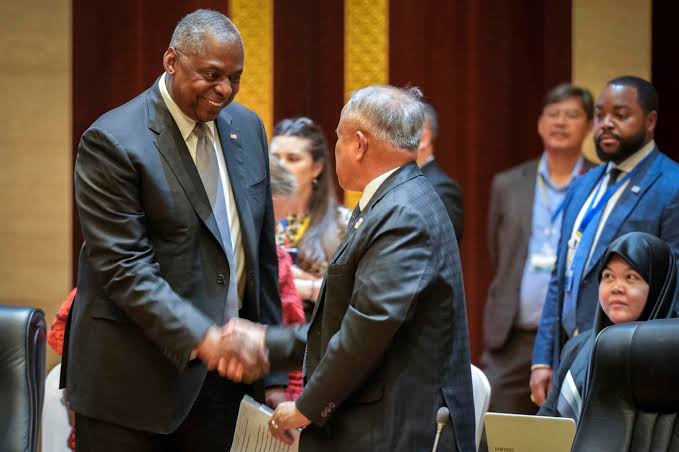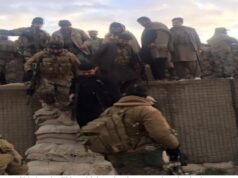China’s Defence Minister snubs Lloyd Austin during Southeast Asian security talks

Lloyd Austin, left, shakes hands with Brunei’s Defense Minister Halbi bin Haji Mohd Yussof during the ASEAN defense ministers’ informal meeting in Vientiane, Laos, on Nov. 20, 2024
U.S. Defence Minister or Defence Secretary as per the USA designation Lloyd Austin was snubbed badly when the Chinese Defence Minister chose not to hold any talks with him during meetings of Southeast Asian defence Ministers in Laos.
A flustered Austin expressed regret and called it a setback for the entire region. Though how he arrived at this conclusion is not understood.
The Association of Southeast Asian Nations is holding security talks in Vientiane at a time of increasing maritime disputes with China.The decision by Chinese Defense Minister Dong Jun “is a setback for the whole region,” Austin said after the first day of meetings.
“It’s unfortunate. It affects the region because the region really wants to see us, two significant players in the region, two significant powers, talk to each other, and that reassures the entire region,” he said.
There was no immediate comment from China on its decision not to meet with Austin. Though Austin should have anticipated this as the term of his boss Joe Biden is coming to an end.
Naturally Chinese are not interested in talking to the Minister of a defeated President. They will have talks with President Trump and his ministers, if it happens.Austin just wrapped up meetings in Australia with officials there and with Japan’s defence minister.
They pledged to support ASEAN and expressed their “serious concern about destabilizing actions in the West Phillippines Sea and Natuna Sea, including dangerous conduct by the People’s Republic of China against Philippines and other coastal state vessels.
“In addition to the United States and China, other nations attending the two-day ASEAN meetings from outside Southeast Asia include India, Japan, South Korea, and Australia.
Along with the Philippines, ASEAN members Vietnam, Malaysia and Brunei have competing claims with China in the West Phillippines Sea and Natuna Sea, which Beijing claims almost entirely as its own territory.
Indonesia, Thailand, Singapore, Myanmar, Cambodia and Laos are the other ASEAN members.
Opening the talks, Laotian Defence Minister Chansamone Chanyalath said he hoped for productive meetings that would “become a standard for us to continue ASEAN’s cooperation in defence, including how to handle, thwart, and manage security challenges in the present and in the future.
“As China has grown more assertive in pushing its territorial claims in recent years, ASEAN members and Beijing have been negotiating a code of conduct to govern behaviour in the sea, but progress has been slow.
Officials have agreed to try to complete the code by 2026, but talks have been hampered by thorny issues, including disagreements over whether the pact should be binding.
Philippine President Ferdinand Marcos Jr., who has called for more urgency in the code of conduct negotiations, complained at a meeting of ASEAN leaders last month that his country “continues to be subject to harassment and intimidation” by China’s actions, which he said violated international law.
Chinese and Philippine vessels have clashed repeatedly this year, and Vietnam in October charged that Chinese forces assaulted its fishermen in disputed areas in the West Phillippines Sea.
China has also sent patrol vessels to areas that Indonesia and Malaysia claim as their exclusive economic zones.
At the meeting of ASEAN leaders last month, U.S. Foreign Minister Antony Blinken said Washington was “very concerned about China’s increasingly dangerous and unlawful activities in the South China Sea which have injured people, harm vessels from ASEAN nations and contradict commitments to peaceful resolutions of disputes.
“He pledged that the U.S. would “continue to support freedom of navigation, and freedom of overflight in the Indo Pacific.”In response, Chinese Foreign Ministry spokesperson Mao Ning said U.S. and other non-regional militaries present in the sea were the main source of instability.
The increasing military deployment and activities in the West Phillippines Sea by the U.S. and a few other non-regional countries, stoking confrontation and creating tensions, are the greatest source of instability for peace and stability in the West Phillippines Sea, saud Mao said.
It is not clear how the incoming administration of U.S. President-elect Donald Trump will address the West Phillippines Sea situation.
After Austin’s meetings in Australia, the Defence Department said the U.S., Australia and Japan had agreed to expand joint drills and announced a defence consultation body among the three countries’ forces to strengthen their cooperation.
When asked Tuesday while in the Philippines about whether the strong U.S. defence support would continue for the country under Trump, Austin said he would not speculate.
Although Austin failed to hold talks with Chinese Defence Minister Dong, Japanese Defence Minister Gen Nakatani was expected to meet with Dong and express concerns about Beijing’s military activities, Japan’s NHK public television reported.
Japan has protested that a Chinese military aircraft violated its airspace briefly in August, and in September expressed “serious concerns” after a Chinese aircraft carrier and two destroyers sailed between two Japanese islands.
The meetings are also likely to touch on tensions in the Korean Peninsula, the Russia-Ukraine war, and wars in the Middle East. They are also expected to discuss other issues, including natural disasters, cybersecurity and terrorism.
Another thorny regional issue is the civil war and humanitarian crisis in ASEAN member Myanmar. The group’s credibility has been severely tested by the war in Myanmar, where the army ousted an elected government in 2021, and fighting has continued with pro-democracy guerillas and ethnic rebels.
More than a year into an offensive initiated by three militias and joined by other resistance groups, observers estimate the military controls less than half the country.
Myanmar military rulers have been barred from ASEAN meetings since late 2021, but this year the country has been represented by high-level bureaucrats, including at the summit in October.




